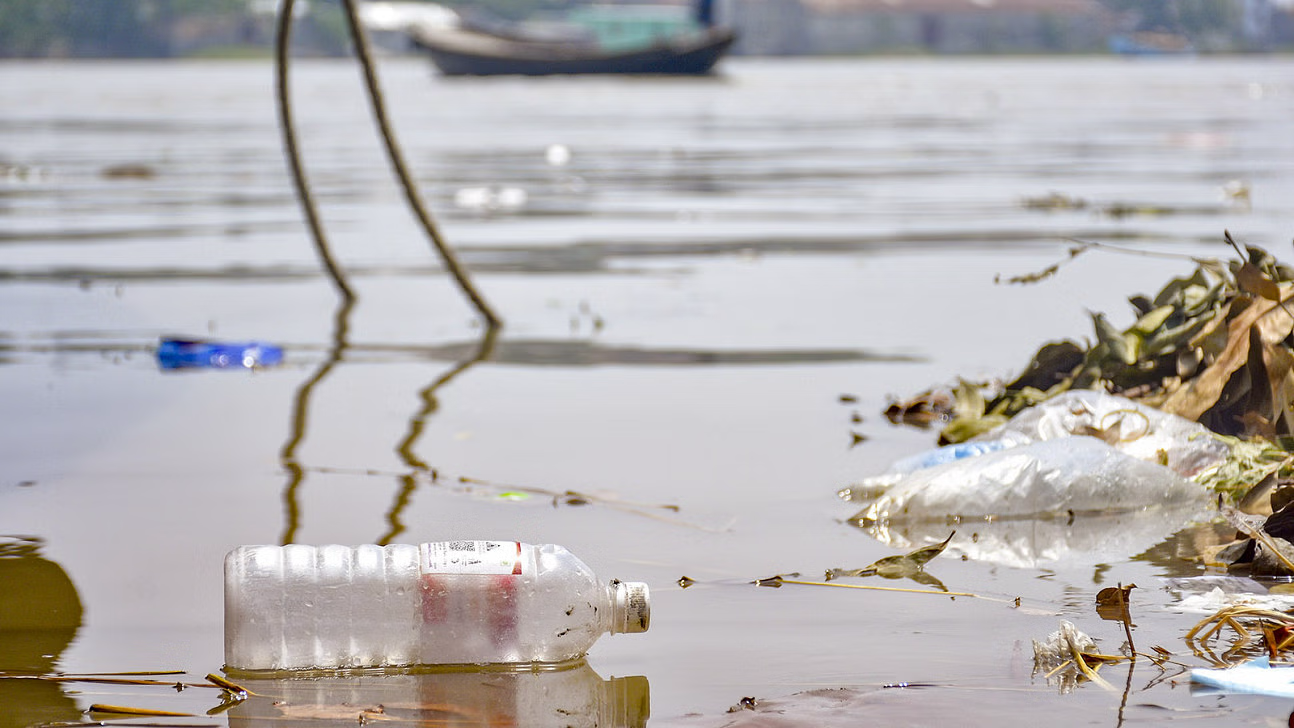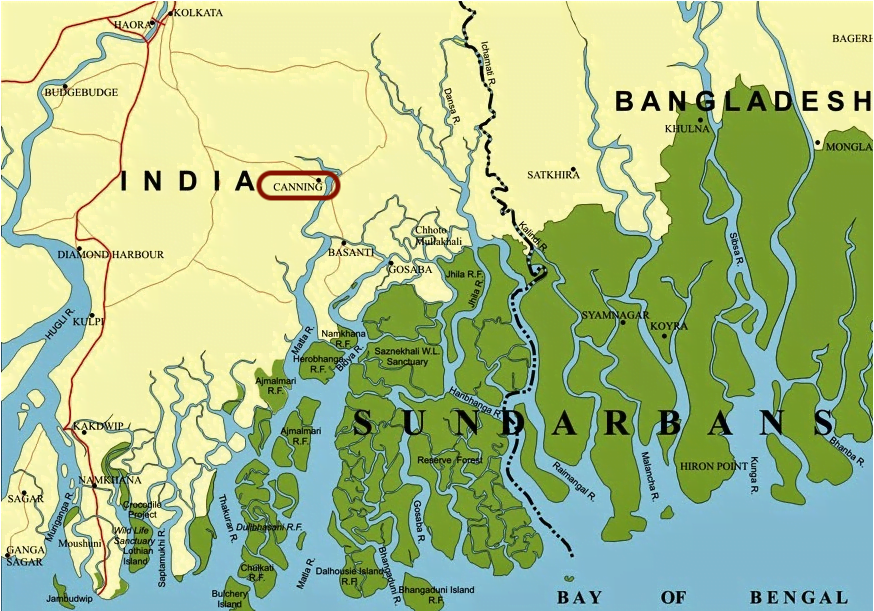Disposable Plastics, Enduring Bonds
Author: Dr. Tridibesh Dey
Editor: Shashank Deora
07/08/2025 | Reflections
Sundarban has become a major site for plastic pollution (Picture Courtesy: Habibur Rahman, The Daily Star, Bangladesh)
Introduction
Residues of petro-capitalism, plastic waste and its enduring ecological impacts have raised significant alarm among the public. This has led to calls within local and global communities to effectively regulate the production and use of plastics. Yet, as plastic production continues to accelerate, estimated to triple current annual rates by 2050, local policies to reduce the use of plastics have also met little success.
Sundarban, a deltaic forest ecosystem and UNESCO World Heritage site across India and Bangladesh (Picture Courtesy: Danda & Mukhopadhyay, WWF, India, 2022)
My essay draws on an ethnographic case from summer 2023 in Canning, the last town and railways terminus in India at the fringes of the Sundarban. It proffers situated insights into why a single-use plastic product continues to be popular. Without discounting the role of powerful lobbies in ensuring unabated plastic production or the action of regressive governments (the US recently rolled back a ban on single-use plastics), the essay foregrounds and problematizes some of the enduring bonds holding single-use plastics in place despite prohibitive regulation and bans.
The Protest for a Plastic Cup
---- “Dada, ekta cha dio” (Brother, one cup of tea, please.)
I overheard a man ask the teaseller in Bengali, the local language. We were at a makeshift teashop outside the railway station in Canning, a busy commercial hub for the Sundarban population. Here - as elsewhere in India, teashops were popular public places, though predominantly masculine, where one congregated for a cup of tea outside home, to socialize, to network, and to partake in juicy local gossip. For me, a cup of milk-tea offered distraction as I waited for my train back to Kolkata.
For my fellow tea-seeker, who had just alighted from a crowded train, this was a necessary pause of recovery before continuing on his journey.
---- “Glass-e cha khabona. Plastic-er cup nai?
(I won’t drink from a glass tumbler. Don’t you have plastic cups?)
The man loudly protested when served tea in a glass tumbler. The teaseller obliged, promptly taking a plastic cup out of its well-packaged stack inside his wooden cupboard, re-serving tea to the man, who now looked content.
The use of plastic teacups remained popular even in peripheral towns like Canning, despite a nationwide ban on single-use plastic products from July 2022.
On Body and Democracy
---- “Chance niy na” (Why take chances?)
Following my curious gaze, the man went on to explain why he did not prefer a glass tumbler. We started talking in Bengali. I told him I am an anthropologist and I had been studying how people in the Sundarban related to plastics in everyday life.
My interlocutor suspected if the glass tumblers had been washed properly, raising concerns about hygiene. Indeed, cleaning demanded time, labour, water and chemical products, perhaps unavailable or unaffordable to the makeshift teashop. As we referred to the used glass tumblers floating together in milky water inside a cleaning gamla (tub) beside the shop, I felt my fellow tea-drinker’s reservations viscerally, reconsidering my own decision to use glass. To drink from such a tumbler was to be open to the possibility of ingesting remnants of saliva of others, and a range of water-borne tropical microbes that came along.
But there was more to the idea of ingestion than undesirable elements entering the body. In South Asian communities, one’s sense of corporal and communal identity is moulded together through centuries of all-pervasive socialization in the hierarchy of castes and caste-based separation in society and space. In this context, a person may be afraid of the bodily substance of another person of lower caste identity, the possibility of intimate contact and ingestion of their saliva invoking ritualised anxieties of contamination. Consequently, they may not want to take a “chance” of contamination by an unknown other at a public teashop.
Writing on garbage and space in India, Dipesh Chakraborty articulates how public places – a product of modern democracy, obliged proximity and inter-mingling of bodies across caste, ethnic, and endogamous groups and thus became affective and political sites of anxious regulation. A train, a railway station, a teashop, despite promising the speed, convenience, and possibilities of a modern life, could emerge as micro-social sites where access, contact, and exposure were actively controlled, leading to forms of exclusion and segregation. In this case, the teashop, where a Brahmin (who occupy the highest rung in the caste ladder) and a Dalit (the oppressed outcast, formerly untouchable) could share space and drink tea together, manifested as a site where the separation of bodies was tacitly being maintained.
The Material Politics of Disposable Plastics
The centrepiece in this context was a plastic cup, the material object which rendered the intimate practice of caste possible. Fresh out of packaging and cheap, the cup was to be thrown after use, unlike its glass counterpart. Its newness, and disposability made it desirable, evoking confidence in its exclusivity: the cup was untouched by another pair of lips. In turn, it made the teashop publicly accessible.
In Pollution in Colonialism, Liboiron argues how disposability – the commercial prescription that a product be discarded after use – has been preconditional to industrial growth in plastic
manufacturing. Disposability fuels regularised demand, helping maintain and expand production cycles. In India, where plastics entered the market late, coinciding with the country’s economic liberalisation, the rise of single-use products in the 1990s oversaw a meteoric rise of plastics within urban waste streams (0.6 percent in 1996 to 9.22 percent in 2005).
My case of the Canning teacup situated the practice of disposability in a micro-social and spatial context not removed from the above global political economy. It visibilized sociomaterial relations that complicated, anchored and operationalized global petro-capitalism even in peripheral towns and forest fringes. While single-use fuelled production and waste, in this case, it also invited new layers of practices and relations that rendered a plastic object and its disposability valuable, rooted within India’s complex socio-political transformation to democracy. The disposable plastic cup helped re-invent practices of consumption, opening up sites and possibilities of interpersonal relation and modern nation-building, while, ironically, holding in place regressive patterns of segregation.
To put it in another way, my case foregrounded complex imbrications of plastics and society that, in this context, problematized and resisted regulation on single-use disposable plastics. To ban plastics effectively, or to replace them with re-usable materials, is not a simple matter of manoeuvring material alternatives or of meeting infrastructural gaps. It is compounded by enduring bonds of social norm that need urgent revision. This will have to involve radical conversations and uneasy practices for socio-cultural change including all the stakeholders of democracy.
We – you, the reader, and I – share worlds overwhelmed by plastics. As scientists demonstrate, plastic’s lifecycle – from petroleum extraction, overproduction to attendant carbon emission, toxic releases, and accumulation of enduring residues – is threatening a range of planetary boundaries, or thresholds of liveability. Plastic and its disposability play a crucial role in this ongoing saga of socio-ecological destruction. While my case foregrounded a practical context in India, I urge fellow STSers to look out for situated relations that complicate the material politics of plastics in their research contexts. As Hawkins argues, there is much to be gained by bringing together our ethnographic cases across seemingly distant sites and contrasting realities. They generate awareness and solidarity, helping broach difficult conversations and engagement.
Acknowledgement
The author thanks Geoffrey Hobbis for his friendly reading and helpful comments.
Submitted on: 9 May 2025
Biography
Dr. Tridibesh Dey (he/him) is anthropologist and STS scholar, International Talent Post-doc Fellow in Knowledge, Technology, and Innovation, Wageningen University, Netherlands. His publications on plastic ontology, infrastructure, and care, have also translated to highly-cited policy recommendations for the ongoing Global Plastic Treaty negotiations. Dey is currently based in Kerala, in the south of India, where he is studying planetarity, petroleum futures, and colonialism.
Published: 08/07/2025


